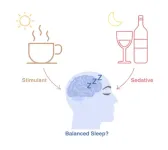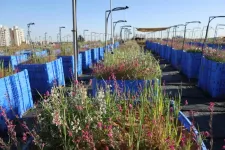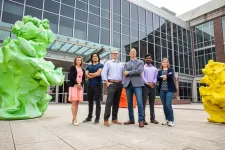(Press-News.org) A digital detox may not improve wellbeing: social media users who reduced their use for a week saw decreases in positive emotions as well as in negative ones
###
Article URL: https://journals.plos.org/plosone/article?id=10.1371/journal.pone.0293467
Article Title: Restricting social networking site use for one week produces varied effects on mood but does not increase explicit or implicit desires to use SNSs: Findings from an ecological momentary assessment study
Author Countries: UK
Funding: This work was supported by the Economic and Social Research Council through a NINE-DTP doctoral studentship to MW (ES/P000762/1) https://www.ninedtp.ac.uk. The funder played no role in study design; in the collection, analysis and interpretation of data; in the writing of the report; and in the decision to submit the article for publication. There was no additional external funding received for this study.
END
A digital detox may not improve wellbeing: social media users who reduced their use for a week saw decreases in positive emotions as well as in negative ones
2023-11-08
ELSE PRESS RELEASES FROM THIS DATE:
Financial traders may seek better sleep by self-medicating with caffeine and alcohol to balance the effects of the stimulant and the sedative, per micro-longitudinal study
2023-11-08
Financial traders may seek better sleep by self-medicating with caffeine and alcohol to balance the effects of the stimulant and the sedative, per micro-longitudinal study
###
Article URL: https://journals.plos.org/plosone/article?id=10.1371/journal.pone.0291675
Article Title: Sleep, alcohol, and caffeine in financial traders
Author Countries: USA
Funding: The authors received no specific funding for this work. END ...
Autism brain states hold the key to unlocking childhood memories
2023-11-08
Neuroscientists have discovered a fascinating connection between the retention of early life memories and brain developmental trajectories associated with autism [Wednesday 8th November 2023].
Most of us remember little of our experiences from before two years of age. This form of memory loss, termed “infantile amnesia” refers to the seemingly complete loss of episodic and autobiographical memories formed during early life. The research team at Trinity College Dublin investigated how infantile amnesia is affected by forms of autism.
The maternal immune response, sparked into life in response to infection during pregnancy, ...
Artificial bladders shine light on bugs that cause urinary tract infections
2023-11-08
The research, published today in Science Advances, is the first to use a sophisticated human tissue model to explore the interaction between host and pathogen for six common species that cause urinary tract infections. The findings suggest that the ‘one size fits all’ approach to diagnosis and treatment currently used in most healthcare systems is inadequate.
Urinary tract infection (UTI) is a growing problem, with around 400 million global cases per year and an estimated 250,000 UTI-related deaths associated with antimicrobial resistance ...
Temperature increase triggers the viral infection
2023-11-08
Researchers at Lund University, together with colleagues at the NIST Synchrotron Facility in the USA, have mapped on an atomic level what happens in a virus particle when the temperature is raised.
"When the temperature rises, the virus's genetic material changes its form and density, becoming more fluid-like, which leads to its rapid injection into the cell," says Alex Evilevitch a researcher at Lund University who led the study.
Viruses lack their own metabolism and the ability to replicate independently; they are entirely dependent on a host cell to multiply. Instead, the virus hijacks the internal machinery of the infected cell ...
Molecule tested at University of São Paulo, in Brazil, proves able to mitigate heart failure
2023-11-08
Researchers at the University of São Paulo (USP) in Brazil, partnering with Foresee Pharmaceuticals, a Taiwan and US-based biopharmaceutical company, have tested a synthetic molecule for the treatment of heart failure. The study, funded by FAPESP, was published yesterday (11/07/2023) in the European Heart Journal. The theme was also highlighted in the magazine's editorial.
Heart failure is a condition in which the heart muscle cannot pump enough blood to meet the body's needs for blood and oxygen. It causes more deaths worldwide than any other disease, in the sense that other cardiovascular disorders ...
How mice choose to eat or to drink
2023-11-08
Making decisions is hard. Even when we know what we want, our choice often leaves something else on the table. For a hungry mouse, every morsel counts. But what if the decision is more consequential than choosing between crumbs and cheese?
Stanford researchers investigated how mice resolve conflicts between basic needs in a study published in Nature on Nov. 8. They presented mice that were both hungry and thirsty with equal access to food and water and watched to see what happened next.
The behavior of the mice surprised the scientists. Some gravitated first ...
Plant lifecycle insights: Big data can predict climate change impact
2023-11-08
The study is based on a new database created by the researchers which combines, for the first time, datasets on distribution and datasets on lifecycles, making it possible to establish the prevalence of different lifecycles around the globe. It uses empirical tools and big data to examine theoretical paradigms about the way in which human disturbance is affecting annual plants and their global distribution. Among other things, it was found that annuals are expected to benefit more with the rise in human population density and due to climate change, which ...
Scientists one step closer to re-writing world’s first synthetic yeast genome, unravelling the fundamental building blocks of life
2023-11-08
Scientists have engineered a chromosome entirely from scratch that will contribute to the production of the world’s first synthetic yeast.
Researchers in the Manchester Institute of Biotechnology (MIB) at The University of Manchester have created the tRNA Neochromosome – a chromosome that is new to nature.
It forms part of a wider project (Sc2.0) that has now successfully synthesised all 16 native chromosomes in Saccharomyces cerevisiae, common baker’s yeast, and aims to combine ...
Scientists take major step towards completing the world’s first synthetic yeast.
2023-11-08
A UK-based team of Scientists, led by experts from the University of Nottingham and Imperial College London, have completed construction of a synthetic chromosome as part of a major international project to build the world’s first synthetic yeast genome.
The work, which is published in Cell Genomics, represents completion of one of the 16 chromosomes of the yeast genome by the UK team, which is part of the biggest project ever in synthetic biology; the international synthetic yeast genome collaboration.
The collaboration, known as 'Sc2.0' has been a 15-year project involving teams from around the world (UK, US, China, Singapore, UK, France and Australia), working together ...
New antifungal molecule kills fungi without toxicity in human cells, mice
2023-11-08
CHAMPAIGN, Ill. — A new antifungal molecule, devised by tweaking the structure of prominent antifungal drug Amphotericin B, has the potential to harness the drug’s power against fungal infections while doing away with its toxicity, researchers at the University of Illinois Urbana-Champaign and collaborators at the University of Wisconsin-Madison report in the journal Nature.
Amphotericin B, a naturally occurring small molecule produced by bacteria, is a drug used as a last resort to treat fungal infections. While AmB excels at killing fungi, it is reserved ...





